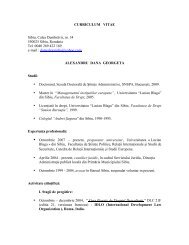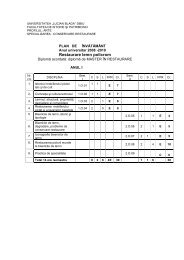Download - Facultatea de Științe Socio-Umane - Universitatea ...
Download - Facultatea de Științe Socio-Umane - Universitatea ...
Download - Facultatea de Științe Socio-Umane - Universitatea ...
You also want an ePaper? Increase the reach of your titles
YUMPU automatically turns print PDFs into web optimized ePapers that Google loves.
Military Justice, Regulations and Discipline in Early Mo<strong>de</strong>rn Transylvanian Armies ...<br />
During night time, after the officers received the password, all loud<br />
noises were forbid<strong>de</strong>n.<br />
When hearing the sound of drums every soldier had to join the rest<br />
of his company un<strong>de</strong>r their banner or flag.<br />
Shepherds and herdsmen were not allowed to leave camp without<br />
the permission of captains, if they failed to obey this rule they were punished<br />
by hanging.<br />
Ordinary soldiers had to obey their superior officers and always be<br />
prepared to join their comra<strong>de</strong>s un<strong>de</strong>r the flag of their company.<br />
No soldier was allowed to offer protection or to ask money for<br />
protection from other members of the royal army 11 .<br />
Another regulation was issued by Stephen Báthory in Vilnius during the year<br />
1579, in the context of the Livonian campaign. This second regulation is mostly<br />
concerned with cavalry units, both in the matter of camp organization and marches. In<br />
or<strong>de</strong>r to avoid the numerous problems that a moving army could face, the regulation<br />
was mainly preoccupied with maintaining the position of soldiers in the marching<br />
formation and also the marching or<strong>de</strong>r of the different troops. During the marching<br />
period, horsemen were forbid<strong>de</strong>n to leave their company. This regulation was<br />
enforced by two sergeants in each company. Each sergeant, but also every single<br />
soldier, was submitted to the jurisdiction of the provost. Fights between soldiers<br />
en<strong>de</strong>d in bloodshed, even in the case of light injuries, were punished by hanging. The<br />
activity of merchants accompanying the army was limited by a particular set of rules.<br />
In or<strong>de</strong>r to join the marching column every merchant nee<strong>de</strong>d the approval of the<br />
general. Once they received the approval they were allowed to sell their wearers only<br />
until dawn, outsi<strong>de</strong> the camp. They were forbid<strong>de</strong>n to receive weapons as payment, or<br />
any other belongings of the soldiers that might prove useful during the campaign 12 .<br />
With the two regulations issued during his reign, Báthory attempted to maintain<br />
discipline in an army with a very heterogenic structure (consisting of Poles,<br />
Lithuanians, Cossacks, Germans, Hungarians and Transylvanians). An army engaged<br />
in campaigns that lasted several consecutive years. Nevertheless we have to un<strong>de</strong>rline<br />
the fact that these regulations were applied only to the troops receiving payment from<br />
the royal treasury. The military organization of the Transylvanian principality<br />
benefited greatly from the experience of the Polish wars of Stephen Báthory. The<br />
following rulers of the principality continued the efforts of strengthening the central<br />
authority by increasing their control over the military structures of the country.<br />
Military regulations were usually enforced by officers and army lea<strong>de</strong>rs, which<br />
were also representing the main justice courts for the soldiers during war time. If<br />
lesser quarrels between ordinary soldiers were judged by captains and lieutenants<br />
(hotnogi), officers were usually judged by the lea<strong>de</strong>r of the army, the prince or his<br />
11<br />
Andrei Veress, Báthory István erdélyi feje<strong>de</strong>lem és lengyel király levelezése, II, (1576-1586), Cluj,<br />
1944, doc. 650, p. 185.<br />
12<br />
Samu Barabás, Báthory István lengyel király hadi rendtartása a lengyel seregben szolgáló magyar<br />
huszárok számára, în „Hadtörténelmi Közlemények”, Budapest, 1890, 667-674.<br />
187





